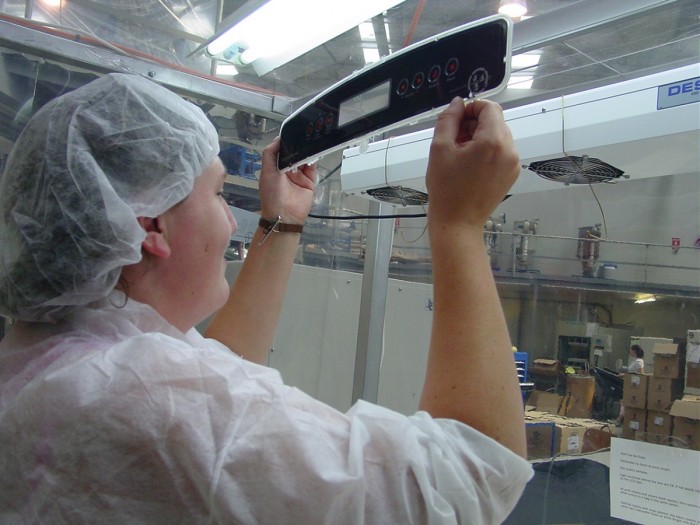Plastics Worker
Kaimahi Kirihou
Alternative titles for this job
Plastics workers operate the machinery that makes, assembles and repairs plastic, composite and rubber products.
Pay
Plastics workers can earn
$24-$25 per hour
Source: Competenz, 2017 and Census 2013.
Job opportunities
Pay
Pay for plastics workers varies depending on experience:
- Apprentices usually earn the minimum training wage or minimum wage an hour.
- Plastic workers can earn up to $25 an hour.
Sources: Competenz, 2017; Census, 2013.
- PAYE.net.nz website - use this calculator to convert pay and salary information
- Employment New Zealand website - information about minimum pay rates
(This information is a guide only. Find out more about the sources of our pay information)
What you will do
Plastics workers may do some or all of the following:
- build full-size models of plastic products
- create moulds for plastic products
- apply materials such as resins or fibreglass to moulds
- fit moulds into machines, and remove them when a production run has finished
- separate, trim and shape the final products
- maintain and repair moulds
- fix basic mechanical and process problems
- check products for defects
- pack, label and weigh products.
Skills and knowledge
Plastics workers need to have knowledge of:
- how to operate tools and machinery
- processes used to make plastic products, and the ability to diagnose production problems
- product standards and safety regulations
- different chemicals, compounds and metals
- heats and speeds needed for mechanical tasks such as welding.
Working conditions
Plastics workers:
- either work shifts or regular business hours. They may be required to work longer hours or weekends to meet deadlines
- work in factories, processing plants and workshops
- may work in smelly, noisy and dusty conditions. They may also work with toxic materials, which require the use of safety equipment
- may travel locally to clients' workplaces to install or repair products.
What's the job really like?

Angela Maclean
Machine Operator
When Angela Maclean started work as a plastics machine operator, she was surprised at the range of products being made. "I didn't really know what to expect. I hadn't heard much about the plastics industry at school and I wondered what else could be made apart from things like plastic bottles. But there are loads of things produced and there's a lot going on."
Checking for quality
Angela contributes to the quality of products that end up in homes both in New Zealand and the USA. "I am in charge of the quality control of what the machine produces. I have to check for defects like smudges or dust marks appearing on the panels. If there are serious problems with the machinery working, I refer to a die setter who works on the machinery settings."
No returns means good news
The reward for Angela is knowing that she has done a good job. This means no news is good news as far as she's concerned. "When we label the products the boxes have our names on them. So we know we have done a good job if we aren't getting our boxes returned to us!"
Entry requirements
To become a plastics worker you need to complete an apprenticeship and gain a New Zealand Certificate in Manufacturing - Plastics (Level 2).
Secondary education
NCEA Level 1 is recommended. Useful subjects include chemistry, construction and mechanical technologies, and processing technologies.
Personal requirements
Plastics workers need to be:
- skilled in interpreting plans and drawings
- good at problem-solving
- accurate and methodical
- able to follow instructions
- able to work independently and in a team
- responsible and safety-conscious.
Useful experience
Useful experience includes:
- work with basic engineering equipment such as welders, lathes and power tools
- any work in the plastics, rubber or composites industry
- work as a mechanical engineer
- work in other factory jobs, particularly shift work.
Physical requirements
Plastics technicians need to be fit and healthy as the job involves some lifting, and they spend long periods on their feet.
Find out more about training
- Competenz
- 0800 526 1800 - info@competenz.org.nz - www.competenz.org.nz
- Composites Association of New Zealand
- (09) 376 7732 - caroline@composites.org.nz - www.composites.org.nz
- Plastics New Zealand
- (09) 255 5662 - www.plastics.org.nz
What are the chances of getting a job?
Strong competition for plastics worker positions
Competition for plastics worker vacancies is high due to:
- being able to enter the job without post-school qualifications
- good on-the-job training opportunities, which make it possible to advance into plastics technician positions
- new processing machines that have replaced plastics workers, which means fewer positions are available.
According to the Census, 1,572 plastics workers worked in New Zealand in 2018.
According to Plastics New Zealand, about 10,000 people work in various roles in the wider plastics industry.
Types of employers varied
Plastics workers work for a range of employers including small- to medium-sized national companies, and large multi-national corporations.
Sources
- Competenz website, accessed September 2017, (www.competenz.org.nz).
- Heida, L, 'Boom Time for Carbon Fibre Recycling', September 2016, (www.recyclinginternational.com).
- McFadden, S, 'Team NZ's Role in the Space Race', 14 March 2017, (www.newsroom.co.nz).
- Ministry of Business, Innovation and Employment, '2006-2014 Occupation Data' (prepared for Careers New Zealand), 2015.
- Packaging Council of New Zealand, Inc. 'Packaging 2016', accessed September 2017, (www.packaging.org.nz).
- Plastics NZ website, 'Careers in Plastics', accessed September 2017, (www.plastics.org.nz).
- Plastics NZ website, 'General Statistics', accessed September 2017, (www.plastics.org.nz).
- Reidy, M, 'NZ Plastics Manufacturing Site for Sale, But no Sign of Slowing Down', 1 August 2017, (www.stuff.co.nz).
- Statistics New Zealand, 'Economic Survey of Manufacturing: June 2017 Quarter', 8 September 2017, (www.stats.govt.nz).
- Stats NZ, '2018 Census Data', 2019.
- Tso, M, 'NZ's First PET Plastic Processing Plant Opens', 16 August 2017, (www.stuff.co.nz).
(This information is a guide only. Find out more about the sources of our job opportunities information)
Progression and specialisations
With further training, plastics workers may progress to become plastics technicians. They can also move into quality management and quality control.
Plastics workers may specialise in:
- die setting
- fibre composites
- plastics moulding
- rubber processing.
Last updated 25 March 2025


